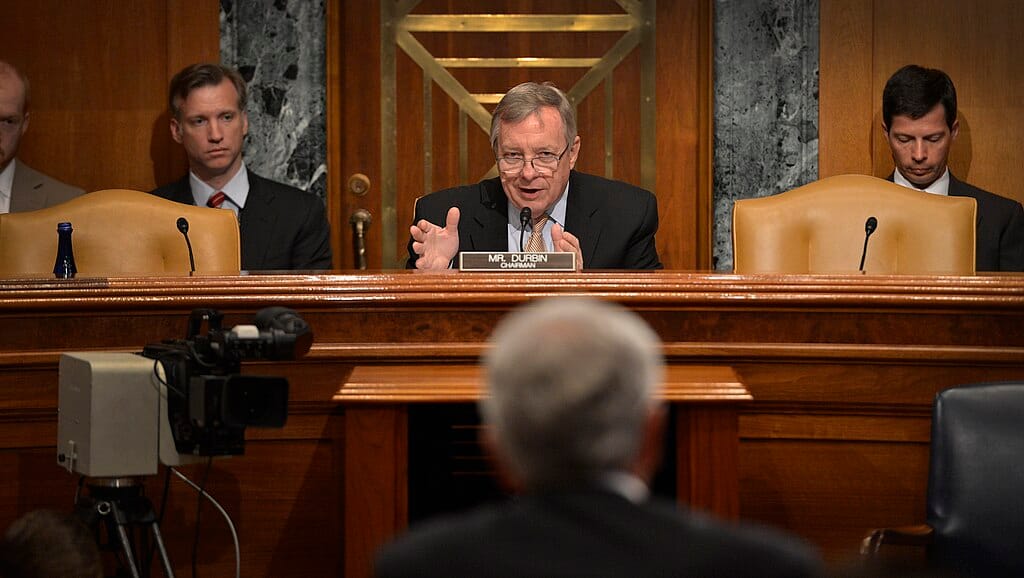Senator Dick Durbin Announces Retirement: The End of an Era in Illinois and the U.S. Senate

Introduction
Senator Dick Durbin, the second-ranking Democrat in the United States Senate and a towering figure in Illinois and national politics, announced on April 23, 2025, that he will not seek reelection in 2026. This decision marks the conclusion of a congressional career that has spanned over four decades, including nearly thirty years in the Senate and fourteen years in the House of Representatives. Durbin’s departure will not only open a rare Senate seat in a solidly Democratic state but also trigger a major leadership shuffle in the Senate Democratic caucus and intensify the generational transition already underway in Congress.
This report examines the context and significance of Durbin’s retirement, his legislative legacy, the immediate political ramifications in Illinois and Washington, and the broader implications for the Democratic Party and the Senate as an institution.
Durbin’s Career: A Legacy of Leadership and Reform
Early Political Ascent
Richard J. Durbin, born in 1944, began his congressional career in 1983 when he was elected to the U.S. House of Representatives from Illinois. He succeeded his mentor, Senator Paul Simon, in the Senate in 1996, after Simon’s retirement, and quickly established himself as a leading liberal voice and a master of Senate procedure[1][2][3].
Durbin’s rise within the Democratic ranks was steady and strategic. By 2005, he was elected by his peers as the Senate Democratic Whip, the second-highest position in the party’s Senate hierarchy—a role he has held continuously, making him one of the longest-serving party whips in Senate history[2:1][3:1][4].
Major Legislative Achievements
Durbin’s legislative record is marked by landmark achievements in public health, immigration, civil rights, and judicial reform.
1. Public Health and Anti-Smoking Advocacy
One of Durbin’s earliest and most enduring legislative victories was his leadership in the movement to ban smoking on commercial flights. Motivated by the loss of his father to lung cancer, Durbin sponsored and won passage of a 1987 law prohibiting smoking on short domestic flights, later expanding it to nearly all flights in the U.S. This campaign catalyzed a broader national conversation about secondhand smoke and public health, leading to widespread bans in public spaces[5][1:1].
2. Immigration Reform and the DREAM Act
Durbin is perhaps best known nationally as the chief architect of the DREAM Act, first introduced in the early 2000s. The bill sought to provide a path to citizenship for undocumented immigrants brought to the U.S. as children. While the DREAM Act itself never passed, Durbin’s advocacy was instrumental in the creation of the Deferred Action for Childhood Arrivals (DACA) program under President Obama, which has shielded more than 800,000 young immigrants from deportation[5:1][1:2][4:1].
3. Judiciary and Civil Rights
As chair and later ranking member of the Senate Judiciary Committee, Durbin played a central role in shaping the federal judiciary, overseeing the confirmation of hundreds of judges, including a Supreme Court Justice. He was a staunch defender of the “blue slip” tradition, which gives home-state senators veto power over judicial nominees, and was a consistent advocate for civil rights and criminal justice reform[1:3][4:2].
4. Appropriations and Budget Leadership
Durbin’s long tenure on the Senate Appropriations Committee gave him significant influence over federal spending, particularly in areas affecting Illinois, such as agriculture, infrastructure, and scientific research[6][3:2].
Leadership Style and Influence
Durbin’s colleagues have consistently described him as a pragmatic dealmaker, a skilled negotiator, and a steady hand during turbulent times. He has been a mentor to many, including former President Barack Obama, who served only four years in the Senate before ascending to the presidency with Durbin’s support[5:2][1:4].
His leadership extended beyond policy to party management, helping to maintain Democratic unity during contentious debates and serving as a bridge between progressives and moderates. Senate Majority Leader Chuck Schumer called Durbin “a trusted partner, one of the most respected voices in the Senate for decades, my dear friend, and, of course, my former roommate,” reflecting the deep personal and professional bonds Durbin forged over his career[7].
The Decision to Retire: Timing, Motives, and Reflections
Age and Generational Change
At 80, Durbin is among the Senate’s most senior members. In interviews, he cited age as a key factor in his decision, noting that by the end of a potential sixth term, he would be 88. He reflected on the aging process in the Senate, observing that while some colleagues, like Bernie Sanders and Chuck Grassley, have remained vigorous into their 80s and 90s, others have not been so fortunate. Durbin expressed a desire to “walk out the front door” on his own terms, rather than risk staying too long and diminishing his effectiveness[6:1].
Political and Institutional Context
Durbin’s retirement comes at a moment of significant upheaval in American politics. The Trump administration’s aggressive use of executive power, ongoing challenges to judicial authority, and deep partisan divisions have tested the Senate’s role as a stabilizing force. Durbin has been a vocal critic of Trump’s policies and tactics, particularly regarding immigration, the judiciary, and the rule of law[8][1:5].
He acknowledged the difficulty of stepping away at such a critical juncture, describing the threats to democracy as “historic and unprecedented.” Nevertheless, Durbin expressed confidence that new leaders are ready to “step up and engage in this battle just as effectively as I can”[1:6][7:1].
The Announcement
Durbin’s decision was closely held until the official announcement, which he made via social media and in interviews. He informed his staff on the morning of April 23, 2025, and released a video statement in which he said, “In my heart, I know it’s time to pass the torch. The threats to our democracy and way of life are real, and I can assure you that I will do everything in my power to fight for Illinois and the future of our country every day of my remaining time in the Senate”[7:2][3:3].
Immediate Political Ramifications
The Illinois Senate Seat: A Rare Opening
Durbin’s retirement sets up a highly competitive Democratic primary in a state where the party has dominated federal elections for decades. Illinois has not elected a Republican to a full six-year Senate term since 1984, and the last GOP senator, Mark Kirk, was defeated by Tammy Duckworth in 2016[5:3][6:2].
Potential Democratic Candidates
A long list of prominent Illinois Democrats is expected to vie for the seat. Among the names floated are:
- Former Chicago Mayor Rahm Emanuel
- Lieutenant Governor Juliana Stratton
- U.S. Representatives Raja Krishnamoorthi, Lauren Underwood, and Robin Kelly
- State Senator Robert Peters
Krishnamoorthi, in particular, has amassed a substantial campaign war chest, and others have strong bases of support in Chicago and across the state. The progressive group 314 Action has already polled on potential candidates, reflecting the intense interest in the race[6:3][9].
Durbin has indicated he does not plan to endorse a candidate in the primary unless he feels compelled by extraordinary circumstances, noting that “there are at least a dozen names that I think are serious”[6:4].
Republican Prospects
While Illinois is a strongly Democratic state, Durbin’s departure gives Republicans a rare opportunity to contest a Senate seat. However, the GOP has struggled to mount competitive campaigns in recent cycles, and any Republican candidate would face an uphill battle[6:5].
Senate Democratic Leadership: A Major Shuffle
Durbin’s retirement will also trigger the first open contest for the Senate Democratic Whip position in a decade, accelerating the generational change already underway in the caucus[10][11]. Several younger senators, including Amy Klobuchar (currently the No. 3 Senate Democrat) and Cory Booker (No. 4), are seen as potential contenders for leadership posts[7:3][11:1].
Durbin’s departure follows the announced retirements of other senior Democrats, including Gary Peters (D-Mich.), Jeanne Shaheen (D-N.H.), and Tina Smith (D-Minn.), further reshaping the party’s leadership structure ahead of the 2026 elections[10:1].
Durbin’s Impact on Illinois and National Politics
Illinois: Advocacy and Deliverables
Durbin’s influence on Illinois politics is difficult to overstate. As the state’s longest-serving senator, he has been a tireless advocate for federal investment in infrastructure, education, healthcare, and scientific research. He played a key role in securing funding for major projects in Chicago and downstate Illinois, and was instrumental in protecting benefits for veterans and seniors[7:4].
His efforts to ban smoking, reform immigration, and expand access to healthcare have had tangible impacts on the lives of millions of Illinoisans. Colleagues and constituents alike have praised his focus on job creation, lowering costs for working families, and championing civil rights[7:5].
National Policy and Party Leadership
Nationally, Durbin’s legislative legacy is defined by his work on immigration, public health, and the judiciary. His leadership on the DREAM Act and DACA has shaped the national debate on immigration reform, while his stewardship of the Judiciary Committee has influenced the composition and direction of the federal courts[1:7][4:3].
As whip, Durbin was often the party’s chief vote-counter and a key strategist during major legislative battles, including the Affordable Care Act, various budget showdowns, and Supreme Court confirmations. His ability to bridge divides within the Democratic caucus and negotiate with Republicans was widely respected, even by political opponents[1:8][7:6].
Challenges and Controversies
Progressive Criticism
Despite his liberal credentials, Durbin has occasionally drawn criticism from the progressive wing of his party. Most recently, he was one of ten Democrats to vote with Republicans for a GOP-crafted stopgap spending measure, a move that drew sharp rebukes from labor, abortion rights, and LGBTQ advocacy groups. Durbin defended his vote as necessary to avert a government shutdown, later meeting with critics to explain his reasoning[8:1][6:6].
Opposition to Trump
Durbin has been a consistent and vocal critic of former President Trump, opposing his trade policies, cabinet appointments, and efforts to dismantle federal agencies. He has also expressed deep concern about Trump’s disregard for court orders and constitutional norms, describing the current political moment as an “inflection point” for American democracy[6:7][1:9].
The Road Ahead: Succession, Legacy, and the Future of the Senate
The Democratic Primary: A Test of Party Direction
The upcoming Democratic primary for Durbin’s seat will serve as a barometer for the direction of the party in Illinois and nationally. With a crowded field of ambitious candidates, the race is likely to highlight generational, ideological, and geographic divides within the party. The winner will inherit not only a Senate seat but also the responsibility of representing Illinois at a time of profound national uncertainty[6:8][9:1].
Senate Leadership: Generational Change
Durbin’s retirement accelerates the ongoing generational shift in Senate leadership. As more senior Democrats step aside, younger members will have the opportunity to shape the party’s agenda and strategy for years to come. The contest for the whip position and other leadership roles will be closely watched as indicators of the party’s future direction[10:2][11:2].
The Senate and American Democracy
Durbin’s reflections on the state of American democracy—his concerns about executive overreach, judicial independence, and the erosion of constitutional norms—underscore the challenges facing the Senate as an institution. His departure, along with those of other senior senators, marks the end of an era and the beginning of a new chapter in the Senate’s evolution[1:10][4:4].
Conclusion
Senator Dick Durbin’s decision to retire after more than forty years in Congress marks the end of a remarkable era in Illinois and national politics. His legislative achievements, leadership in the Senate, and advocacy for public health, immigration reform, and civil rights have left an indelible mark on the nation.
As Illinois prepares for a fiercely contested Senate race and the Democratic caucus braces for a major leadership transition, Durbin’s legacy will loom large. His career exemplifies the virtues of public service, principled leadership, and pragmatic compromise—qualities that will be sorely needed as the Senate and the country navigate the uncertain years ahead.
In his own words, Durbin summed up his career and his decision to step aside: “In my heart, I know it’s time to pass the torch. The threats to our democracy and way of life are real, and I can assure you that I will do everything in my power to fight for Illinois and the future of our country every day of my remaining time in the Senate.” As the Senate and the nation look to the future, Durbin’s example offers both a challenge and an inspiration to those who would follow in his footsteps.
https://www.nytimes.com/2025/04/23/us/dick-durbin-retires-senate.html ↩︎ ↩︎ ↩︎ ↩︎ ↩︎ ↩︎ ↩︎ ↩︎ ↩︎ ↩︎ ↩︎
https://www.scrippsnews.com/politics/congress/longtime-sen-dick-durbin-to-leave-senate-after-30-years ↩︎ ↩︎
https://www.cbsnews.com/chicago/news/illinois-senator-dick-durbin-not-running-reelection-retirement/ ↩︎ ↩︎ ↩︎ ↩︎
https://www.cnn.com/2025/04/23/politics/dick-durbin-senate-retirement/index.html ↩︎ ↩︎ ↩︎ ↩︎ ↩︎
https://wtop.com/national/2025/04/dick-durbin-of-illinois-the-senates-no-2-democrat-wont-seek-reelection-to-a-sixth-term-in-2026/ ↩︎ ↩︎ ↩︎ ↩︎
https://ipmnewsroom.org/longtime-illinois-u-s-sen-dick-durbin-wont-seek-reelection/ ↩︎ ↩︎ ↩︎ ↩︎ ↩︎ ↩︎ ↩︎ ↩︎ ↩︎
https://abcnews.go.com/Politics/sen-dick-durbin-announces-retirement-after-decades-congress/story?id=121089205 ↩︎ ↩︎ ↩︎ ↩︎ ↩︎ ↩︎ ↩︎
https://www.politico.com/news/2025/04/23/dick-durbin-retiring-from-senate-illinois-00305833 ↩︎ ↩︎
https://www.nbcnews.com/politics/congress/longtime-democratic-sen-dick-durbin-will-not-seek-re-election-2026-rcna201138 ↩︎ ↩︎
https://www.axios.com/2025/04/23/dick-durbin-illinois-senate-retirement ↩︎ ↩︎ ↩︎
https://news.bgov.com/bloomberg-government-news/durbins-decision-set-to-spur-senate-democrat-leadership-shuffle-10 ↩︎ ↩︎ ↩︎




